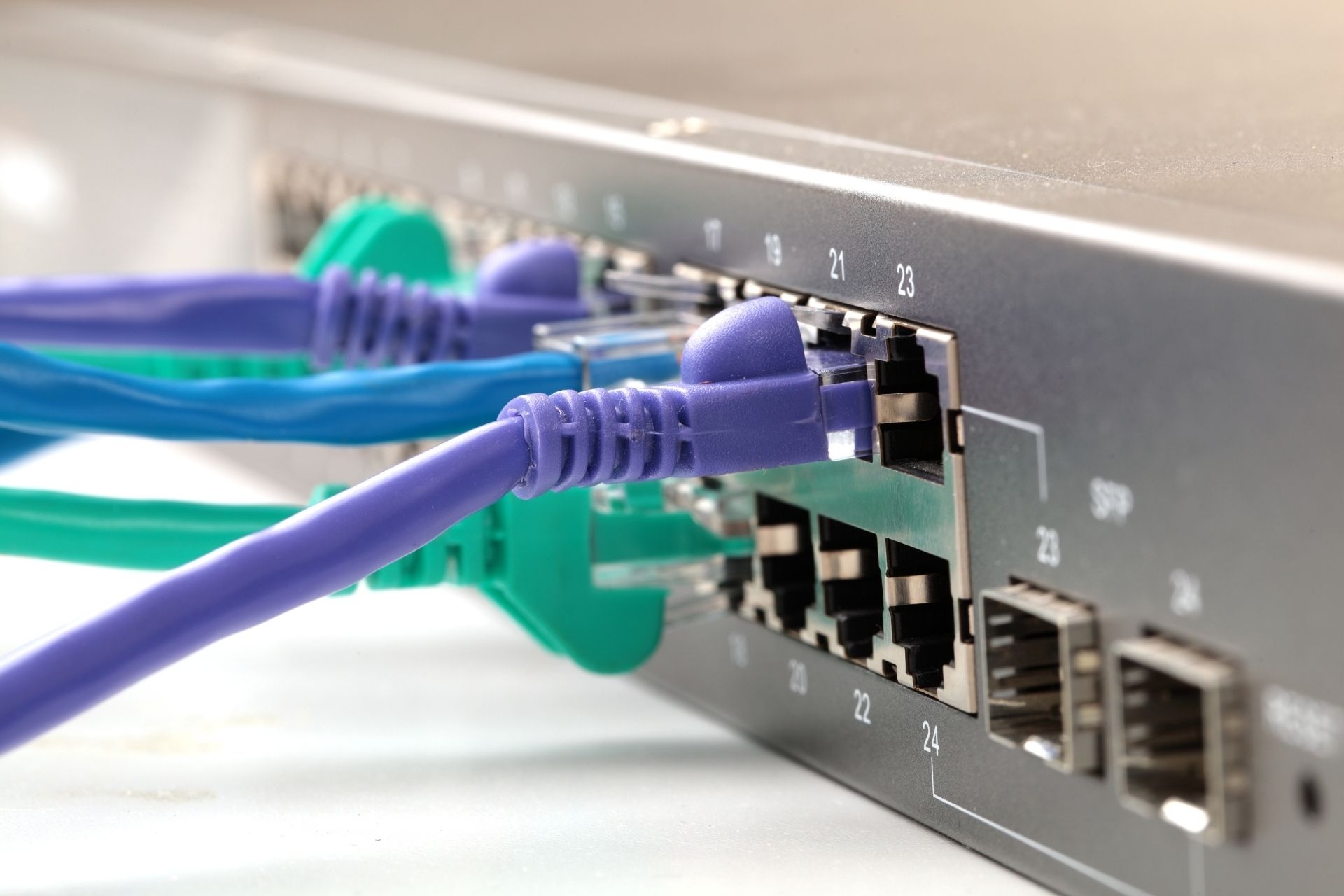

TCP/IP handles packet fragmentation by breaking down large data packets into smaller fragments that can be transmitted across the network. This fragmentation process allows for efficient data transfer over networks with varying maximum transmission unit (MTU) sizes, ensuring that data can reach its destination without being lost or corrupted.
The maximum size of a TCP/IP packet before it needs to be fragmented is determined by the MTU of the network it is being transmitted over. The standard MTU size for Ethernet networks is 1500 bytes, meaning that any packet larger than this size will need to be fragmented into smaller packets to be successfully transmitted.
Many would have heard the recent news about the numerous redundancies within the Games Industry. Sadly, there are many more job losses to come, and this will affect many jobs...
Posted by on 2024-02-01
Connected and live within 10 working days: The Real Greek in Paradise street Liverpool has now been connected at Gigabit speeds to Baltic Broadband’s 100Gbps fibre network that circles Liverpool...
Posted by on 2024-01-22
Our team at Baltic Broadband really enjoyed working on Paramount’s eagerly awaited original drama series Sexy Beast, which has now been released! Facilitated by the Liverpool Film Office, the production...

Posted by on 2024-01-09
Baltic Broadband have today launched Liverpool City Region Data Centres (LCRDC) as a separate brand to it’s Broadband business. Previously, offering Data Centre space had been a service that has...
Posted by on 2024-01-08
For years, Escape Live struggled with poor performing broadband from the national providers. After waiting almost 2 years for them to deliver a fast and reliable product, they lost patience...

Posted by on 2024-01-03
Packet fragmentation can indeed cause issues with data transmission and network performance. When packets are fragmented, it can lead to increased overhead and processing time at both the sending and receiving ends of the connection. Additionally, if any of the fragmented packets are lost or arrive out of order, it can result in delays and retransmissions, impacting overall network efficiency.

The receiving end of a TCP/IP connection reassembles fragmented packets by using the identification fields in the packet headers to determine the correct order in which the fragments should be reassembled. Once all the fragments have been received, they are put back together to reconstruct the original data packet before it is delivered to the application layer.
TCP/IP includes protocols such as Internet Protocol (IP) and Transmission Control Protocol (TCP) that help manage packet fragmentation. IP is responsible for breaking down and reassembling packets, while TCP ensures that data is reliably transmitted and received in the correct order. Additionally, Path Maximum Transmission Unit Discovery (PMTUD) is a mechanism within TCP/IP that helps determine the optimal MTU size for data transmission to avoid fragmentation.

One potential security risk associated with packet fragmentation in TCP/IP communication is the possibility of a malicious attacker exploiting the process to evade detection or launch a denial-of-service attack. By fragmenting packets in a specific way, an attacker may be able to bypass security measures or overwhelm a network with a large number of fragmented packets, causing disruptions in service.
The process of packet fragmentation differs between IPv4 and IPv6 in TCP/IP networks in terms of the header structure and handling of fragmentation. In IPv4, fragmentation is handled by routers along the path of the packet, with each router potentially fragmenting the packet further. In contrast, IPv6 was designed to minimize the need for fragmentation by using a larger default MTU size and requiring end-to-end communication to handle fragmentation, reducing the complexity and overhead associated with packet fragmentation.

Bulk internet providers in different regions are subject to various regulatory requirements that govern their operations. In the United States, the Federal Communications Commission (FCC) plays a key role in overseeing the activities of bulk internet providers, ensuring compliance with net neutrality rules, data privacy regulations, and consumer protection laws. In the European Union, the Body of European Regulators for Electronic Communications (BEREC) sets guidelines for bulk internet providers to promote competition, protect user data, and ensure quality of service. In Asia, countries like Japan and South Korea have their own regulatory bodies that oversee bulk internet providers to maintain fair competition, safeguard user privacy, and uphold service standards. Overall, regulatory requirements for bulk internet providers vary by region but generally focus on promoting competition, protecting consumer rights, and ensuring the reliability and security of internet services.
Bulk internet providers ensure compatibility with IoT devices by implementing protocols such as MQTT, CoAP, and AMQP to facilitate seamless communication between devices and their respective platforms. They also utilize IPv6 addressing to accommodate the vast number of connected devices in IoT ecosystems. Additionally, these providers offer robust security measures like TLS encryption, OAuth authentication, and role-based access control to safeguard data transmitted between IoT devices and cloud servers. By conducting regular firmware updates and interoperability testing, bulk internet providers can guarantee that their networks can support a wide range of IoT devices, including sensors, actuators, wearables, and smart appliances. This proactive approach ensures that IoT devices can connect reliably and securely to the internet, enabling users to leverage the full potential of their interconnected devices.
Bulk internet providers must consider several factors when implementing IPv6. These considerations include ensuring network compatibility, updating hardware and software, training staff on IPv6 protocols, conducting thorough testing to identify and resolve any issues, and communicating with customers about the transition. Additionally, providers must consider the potential impact on network performance, security measures, and the need for IPv4 to IPv6 translation mechanisms. It is crucial for bulk internet providers to carefully plan and execute the IPv6 implementation process to ensure a smooth transition and continued high-quality service for their customers.
Bulk internet providers utilize advanced network management techniques to handle data prioritization during peak times. This includes implementing Quality of Service (QoS) protocols to ensure that high-priority traffic, such as video streaming or online gaming, is given precedence over lower-priority traffic like email or web browsing. Additionally, these providers may employ traffic shaping algorithms to allocate bandwidth more efficiently and prevent network congestion. By monitoring network traffic patterns in real-time, bulk internet providers can dynamically adjust data prioritization settings to optimize performance for all users during peak usage periods. This proactive approach helps maintain a consistent and reliable internet experience for customers, even during times of high demand.
Bulk internet providers ensure Quality of Service (QoS) through a combination of network monitoring, traffic shaping, and prioritization techniques. By utilizing deep packet inspection, Quality of Experience (QoE) metrics, and Quality of Protection (QoP) mechanisms, these providers can effectively manage bandwidth allocation, latency, jitter, and packet loss to meet the needs of their customers. Additionally, the implementation of Service Level Agreements (SLAs), Quality of Experience (QoE) monitoring tools, and Quality of Protection (QoP) protocols help to guarantee a consistent and reliable internet connection for users. Through continuous performance monitoring, proactive network maintenance, and efficient resource allocation, bulk internet providers can deliver a high level of Quality of Service to their customers.
The General Data Protection Regulation (GDPR) has significant implications on bulk internet data handling, particularly in terms of ensuring compliance with data protection laws, implementing data minimization practices, obtaining explicit consent for data processing, and maintaining data security measures. Organizations that handle large volumes of internet data must adhere to GDPR requirements, such as conducting data protection impact assessments, appointing data protection officers, and implementing privacy by design principles. Failure to comply with GDPR regulations can result in severe penalties, including fines of up to €20 million or 4% of global annual turnover, whichever is higher. Therefore, it is crucial for entities involved in bulk internet data handling to prioritize GDPR compliance to avoid legal consequences and protect individuals' privacy rights.